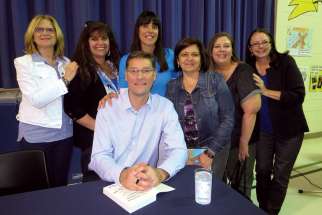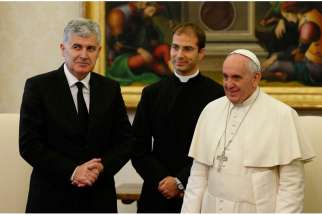Mary’s Meals feeds a million kids a day
Students at Sacred Heart Catholic Elementary School in Niagara Falls, Ont., were buzzing with excitement when they heard Magnus MacFarlane-Barrow, founder and CEO of Mary’s Meals, was coming to visit. The school only had about a week to prepare for his June 2 visit, but it was obvious where to start.
SARAJEVO, Bosnia-Herzegovina - Conflict and cruelty must be fought with tenderness, forgiveness and bearing Christ's cross, Pope Francis said.
SARAJEVO, Bosnia-Herzegovina - To overcome fear, discrimination and conflict, people must have a deep desire to open themselves up to God and his mercy, and work actively for peace every day, Pope Francis said.
ABOARD THE PAPAL FLIGHT FROM SARAJEVO, Bosnia-Herzegovina - Pope Francis said the Vatican was ready to make an announcement concerning the alleged Marian apparitions in Medjugorje, Bosnia-Herzegovina.
Pope heads to Bosnia as 'brother messenger of peace'
VATICAN CITY - Pope Francis said he will dedicate his one-day visit to Bosnia-Herzegovina to encouraging a minority Catholic community in the faith, fostering ecumenical and interreligious dialogue, and calling for peace and harmony after the devastations of war.
VATICAN CITY - A papal visit to Bosnia-Herzegovina brings hope, joy and some "soul" to this ethnically divided, Catholic-minority Balkan nation, the country's cardinal said.
VATICAN CITY - Pope Francis' concern for those suffering on the margins and for small Catholic communities that have kept the faith alive through war or repression will take him to Bosnia-Herzegovina in early June.
Pope to visit Balkan nation still scarred by ethnic divisions
VATICAN CITY - In an effort to help bolster a minority Catholic population and encourage dialogue and friendship among once-warring ethnic and religious communities, Pope Francis announced he would be visiting Bosnia-Herzegovina.
Bosnia's Catholic leaders say real dialogue impeded by injustices
Catholic leaders in Bosnia-Herzegovina said real ethnic and religious dialogue is not occurring and not all religions have equal rights.
"Real dialogue" is being impeded by "legalized war crimes and injustices," as well as by failure to implement the peace accord that ended the country's 1992-95 war, said Msgr. Ivo Tomasevic, secretary-general of Bosnian bishops' conference.
Tomasevic welcomed a September interfaith peace appeal, issued in Sarajevo after an international peace meeting sponsored by the Rome-based Sant'Egidio Community gathered 2,000 Catholic, Orthodox, Protestant, Muslim, Jewish, Buddhist and Hindu representatives.
However, in a Sept. 19 interview with Catholic News Service, he said the country still lacks a firm foundation for religious and ethnic co-existence.
"Peace is firstly a gift from God, so it's important all faiths and confessions pray for it together," he said. "But we also need to work for peace, at a time when our Catholic population has almost halved and the Catholic presence in Sarajevo is dwindling year by year."
Tomasevic said participants had expressed a wish to create a zone of peace in Bosnia-Herzegovina, where more than 100,000 people died in the war.
Earlier, the president of the Bosnian bishops' conference told the Croatian daily Vecernji List that he had questioned claims at the meeting that his country offered an example of religious and ethnic reconciliation.
"In no other European country has the plight of Catholics been as dramatic as here — at least half have left, and those who remain have problems finding a roof over their heads, food, jobs and conditions for life," Bosnian Bishop Franjo Komarica of Banja Luka said in the interview, published Sept. 16.
"I pointed this out many times during the meeting and was warned participants knew nothing about these things. I accepted this, although I don't know whether people are uninformed, or rather uninterested."
Bosnian newspapers said Bosnia's Grand Mufti Mustafa Ceric had rejected complaints by Catholic and Orthodox leaders at the meeting that growing Muslim domination had left Christians with no future in Sarajevo.
A statement issued by participants at the end of the Sept. 8-11 meeting said Bosnia was a reminder of hostilities caused by religious and ethnic differences, but also of the "grace of dialogue" and of "how to build the future."
"Religious and national communities in Sarajevo remind us war is a great evil and leaves a poisoned legacy," the statement said. "Although we are different, we unanimously believe different people can live together fruitfully anywhere in the world. This is possible in Sarajevo and elsewhere — we must prepare responsibly for the future."
Catholics made up 18 per cent of the 4.3 million citizens of Bosnia-Herzegovina, with Muslims and Orthodox Serbs constituting 44 per cent and 35 per cent, respectively, before the war, which ended with the formation of separate Serb and Croat-Muslim territories in a united country.
Tomasevic told CNS that religious leaders could not make the political decisions needed to create firmer foundations for peace, adding that he feared the meeting's final statement could be misused by local politicians.
"The peace meeting was all very well, but we still need a more-just society where the three constituent peoples will have equal rights," Tomasevic said.
"It's important we shape consciences so people will be open to dialogue and tolerant of differences. But injustices are occurring not just at the level of power, but in ordinary life as well. Until a better foundation is created, our personal goodness will not be enough."
OXFORD, England - Sarajevo Catholic officials say the city's Muslim-dominated government is not protecting minority rights, but the mayor said his city is committed to providing a home for all religious faiths.
Sarajevo Mayor Alija Behmen said city authorities "treat all citizens equally and pay equal attention to all -- the structure of the city council and city administration is multinational and multireligious."
"Sarajevo has cultivated multiculturalism for centuries, which is a rarity in Europe, and will continue doing so. This is an axiom for our city's authorities," Behmen told Catholic News Service.










